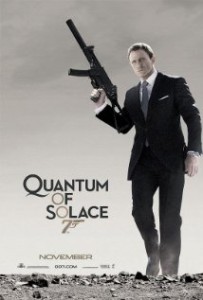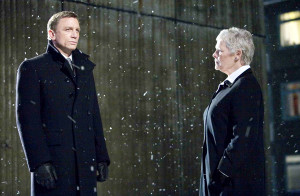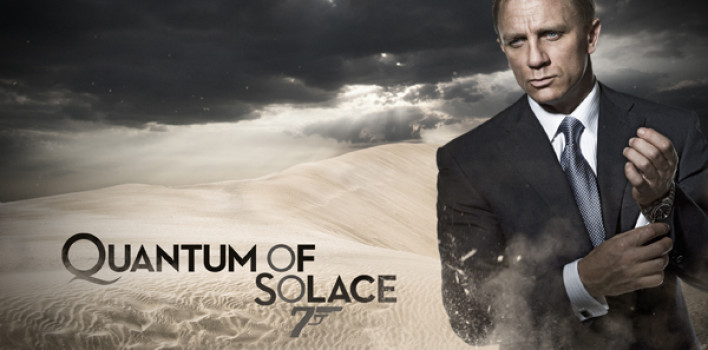Review| Quantum of Solace
 Sandwiched between the two best Bond films (in my humble opinion) is Quantum of Solace. I think it is a truth universally acknowledged that Casino Royale set the bar really high. It’s not only a brilliant Bond film, it’s a brilliant film in general. Skyfall is equally just as so, but Quantum’s story and substance feels created for short film, not feature.
Sandwiched between the two best Bond films (in my humble opinion) is Quantum of Solace. I think it is a truth universally acknowledged that Casino Royale set the bar really high. It’s not only a brilliant Bond film, it’s a brilliant film in general. Skyfall is equally just as so, but Quantum’s story and substance feels created for short film, not feature.
Though I’ve only glanced through the novels, I’ve spoken with several readers who confirm that Craig’s Bond most closely resembles Fleming’s original character. Perhaps not in looks, but definitely in style and personality. Fleming’s Bond is actually more of a noir-type hero. In previous cinematic portrayals, Bond is depicted very two-dimensionally; suave, womanizing, smug, and overall unrealistic regardless of how entertaining to watch.
This is why I must quickly interject that Craig is the best James Bond (blonde hair included), simply because his Bond has the necessary emotional depth, believable sophistication, and mystique. His exterior is stone cold, but underneath those icy blue eyes is a red, beating heart that drives the character to become someone we can root for and ultimately understand on a personal level. Not to mention, the writing and production value in his films are top notch.
This does not apply, however, to Quantum of Solace. Don’t get me wrong, it’s not a bad film, it’s just not on the level it could be. Even the opening song was mediocre, especially when compared to Casino and Skyfall, both of which had fantastic stand-alone tunes. Quantum’s “Another Way to Die,” performed by Alicia Keys and Jack White, sounds like a song rejected from the Pierce Brosnan days. Don’t even get me started on the intro’s ridiculous female silhouettes in the sand…
 This film is unusual in that it takes place right after the previous one with very little time having passed in-between. I can’t say much for the plot in this film. It’s very clouded and confusing, and it seems to be over before the audience can even understand what happened. Most of it is lots of talk about oil, global warming, and water supply, thrown in with the quests for revenge across Bolivia. Even the villain’s full potential is not tapped into. He has very steep moments of despicable abuse and overall sliminess, then other times where he appears weak and dull. In light of going back to this film after having seen Javier Bardem’s bone-chilling performance as Raoul Silva in Skyfall, Quantum’s villain seems especially formulaic.
This film is unusual in that it takes place right after the previous one with very little time having passed in-between. I can’t say much for the plot in this film. It’s very clouded and confusing, and it seems to be over before the audience can even understand what happened. Most of it is lots of talk about oil, global warming, and water supply, thrown in with the quests for revenge across Bolivia. Even the villain’s full potential is not tapped into. He has very steep moments of despicable abuse and overall sliminess, then other times where he appears weak and dull. In light of going back to this film after having seen Javier Bardem’s bone-chilling performance as Raoul Silva in Skyfall, Quantum’s villain seems especially formulaic.
I have always loved the relationship between M and 007, and Daniel Craig and Judi Dench take that chemistry to a new level. In this regard, Quantum is a great precursor to the tragic events that take place in the following film. Here M subtly reveals her regard for Bond and how much she understands his heartbreak over Vesper. Bond refers to M when speaking with Camille at a later point in the film. Camille asks if M is his mother, he replies, “She likes to think so.” M really does like to think so. Although they both maintain the British stiff-upper-lip of professionalism, it’s quite obvious they both care for each other on a personal level.
In fact, M cares for him so much that she’s isn’t afraid to call him out She does so in regard to just about everything he does in this film, from his needless killings to his searing rage blinding him to the consequences of his actions. One of my favorite scenes is when she confronts him in Bolivia about his recklessness with women, women who put their trust in him and are willing to die for him. With Vesper, it was on a deeper level of mutual love and respect. However, in this film it’s an innocent desk agent, Fields, who falls for his charms, sleeps with him, and ends up drowning in oil because of it.
M: “Why her, Bond? She was just supposed to send you home. She worked in an office, collecting reports. Look how well your charm works, James. They’ll do anything for you, won’t they?”
 We can see M is pained not only by 007’s actions but also by the fact that his recklessness forces her to restrain and suspend him. It is indeed quite similar to that motherly despair when your child is out-of-control and won’t listen to reason.
We can see M is pained not only by 007’s actions but also by the fact that his recklessness forces her to restrain and suspend him. It is indeed quite similar to that motherly despair when your child is out-of-control and won’t listen to reason.
I noticed in this film, Bond seems to speak less than in any other. His dialogue is in his silence and brooding. It’s through the other characters we are shown his struggle, namely M, but also Mathis, and Camille who connect with his hurt. Mathis asks Bond to forgive Vesper and forgive himself for what happened to her. Camille has been on a practically lifelong pursuit of revenge and knows what it’s like to be driven by anger and hate.
I really like Camille and wish the story had done her more justice. Though Bond kisses her in the end, their relationship is primarily non-sexual. For a Bond film, that’s impressive! Their pain is what brings them together in an understated comradery throughout the film. They bond through the desire to help each other find what they are looking for.
My only wish is that this trend of female heroines needing an emotional reason for doing things would end. In this case, it makes sense to have a character that can mirror Bond’s own inner reflection, dealing with heartbreak, death, and vengeance. However, 90% of the time, in action/sci-fi/adventure/thrillers, the female characters are driven by some kind of trauma or need to seek revenge as a way of proving themselves or being able to make it in whatever “man’s world” they find themselves in. I’m not implying that emotional or vengeful needs are not common enough to tell stories about. I’m simply pointing out that it’s a rarity when female leads are driven simply by their passions or their own longing for heroism, rather than an emotionally rooted ambition.
 Initially, I struggled to understand the meaning of the title as it applies to the film. Quantum was the name of villain Dominic Greene’s secret organization, but that’s not enough. I think naming the organization that distracts from what the film is actually trying to say.
Initially, I struggled to understand the meaning of the title as it applies to the film. Quantum was the name of villain Dominic Greene’s secret organization, but that’s not enough. I think naming the organization that distracts from what the film is actually trying to say.
It wasn’t until my recent viewing that I decided to actually break down the title’s meaning. Quantum means “a particular amount or portion” and solace “comfort in sorrow, misfortune, or trouble; alleviation of distress or discomfort.” So when broken down it makes perfect sense. Finding that measure of comfort in sorrow and distress is exactly what Bond needs in the film, as does Camille. I think this is why it feels like it should have been a short film to me; this point could have been made in less screen-time. I think Bond reached his quantum of solace moreso in the end of Skyfall and I hope to see this theme continue in this week’s upcoming, much anticipated Spectre. Thankfully, Craig’s films give us not only an arc in each movie, but a complete arc for the character over time.







